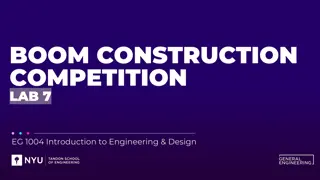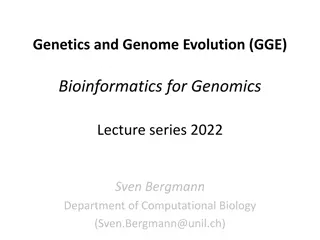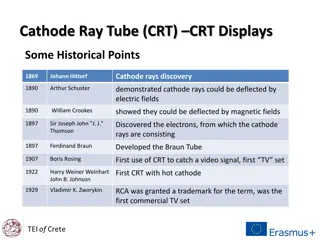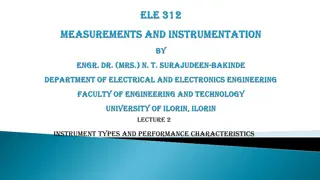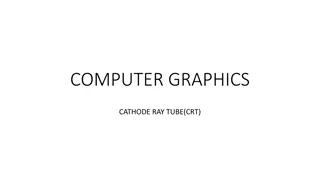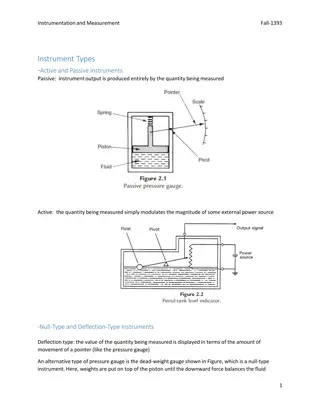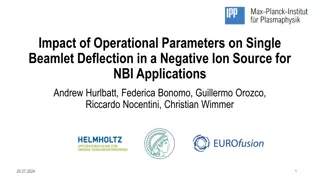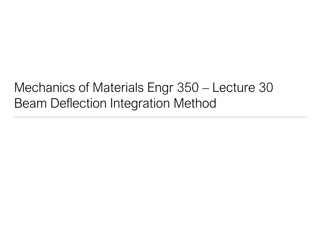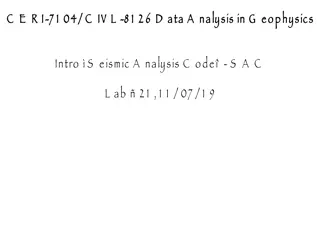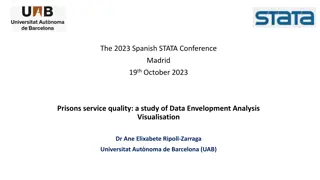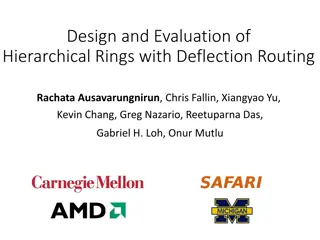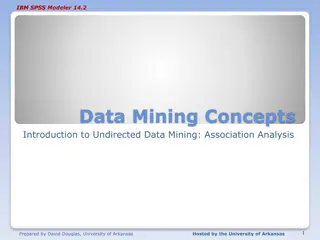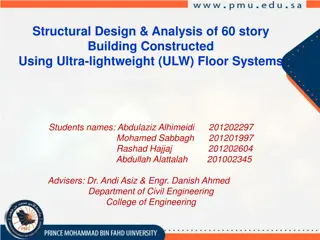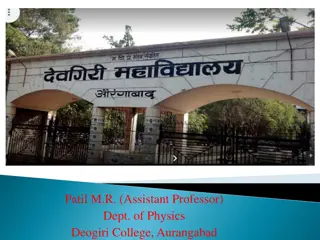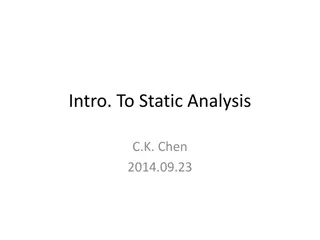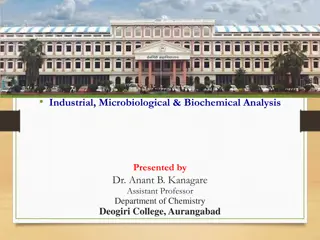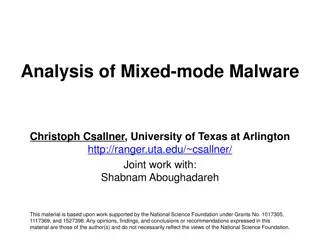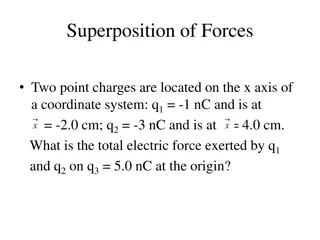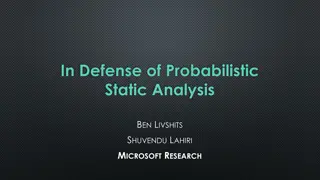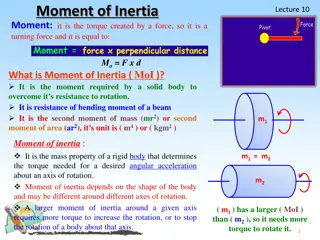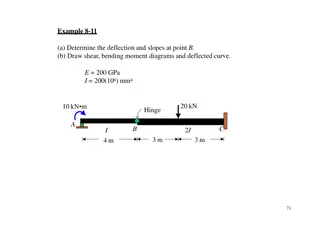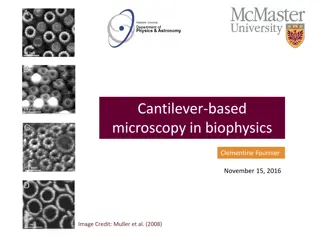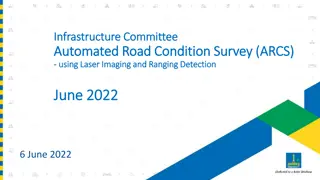Algorithm Analysis
Algorithm analysis involves evaluating the efficiency of algorithms through measures such as time and memory complexity. This analysis helps in comparing different algorithms, understanding how time scales with input size, and predicting performance as input size approaches infinity. Scaling analysi
1 views • 30 slides
Market Analysis (Project Formulation)
This detailed guide covers essential aspects of market analysis and project formulation in entrepreneurship, including feasibility analysis, techno-economic analysis, market demand analysis, steps in market analysis, and factors to consider for market demand analysis. Explore how to assess market de
2 views • 30 slides
BOOM CONSTRUCTION COMPETITION LAB 7
Explore the world of engineering and design through the challenge of creating a lightweight boom capable of withstanding significant loads with minimal deflection. Gain insights into stress, strain, material properties, and competition dynamics as you construct, test, and compete with your boom desi
0 views • 22 slides
Static Analysis Techniques Overview
Explore static analysis techniques such as syntactic analysis, dataflow analysis, and model checking. Understand the concept of basic blocks in static analysis and their boundaries. Dive into the opportunities provided by static analysis in summarizing program behavior without executing it.
9 views • 27 slides
Bioinformatics for Genomics Lecture Series 2022 Overview
Delve into the Genetics and Genome Evolution (GGE) Bioinformatics for Genomics Lecture Series 2022 presented by Sven Bergmann. Explore topics like RNA-seq, differential expression analysis, clustering, gene expression data analysis, epigenetic data analysis, integrative analysis, CHIP-seq, HiC data,
0 views • 36 slides
Evolution of Cathode Ray Tube (CRT) Displays: Historical Milestones
The historical evolution of Cathode Ray Tube (CRT) displays is highlighted, starting from the discovery of cathode rays in 1869 by Johann Hittorf to the development of the first commercial TV set by RCA in 1929. Key milestones include the demonstration of electron deflection by electric and magnetic
0 views • 46 slides
Understanding Instrument Types and Performance Characteristics
This content discusses different types of instruments, including active and passive, null-type and deflection-type, analog and digital, as well as smart and non-smart instruments. It delves into the static characteristics of instruments such as accuracy, precision, tolerance, linearity, and sensitiv
2 views • 39 slides
Comprehensive Cost Management Training Objectives
This detailed training agenda outlines a comprehensive program focusing on cost management, including an overview of cost management importance, cost object definition, cost assignment, analysis, and reporting. It covers topics such as understanding cost models, cost allocations, various types of an
2 views • 41 slides
Understanding Cathode Ray Tube (CRT) Technology in Computer Graphics
Explore the technology of Cathode Ray Tube (CRT) used in traditional computer monitors and televisions. Learn about its components such as the electron gun, control electrode, focusing system, deflection yoke, and phosphorus-coated screen. Discover how a CRT works through the movement of electron be
1 views • 7 slides
Understanding Instruments in Instrumentation and Measurement
Passive and active instruments play key roles in measurement, with null-type and deflection-type instruments providing different ways to display values. Analogue and digital instruments offer varying outputs, while indicating instruments and those with signal outputs serve different purposes. Smart
2 views • 12 slides
Qualitative Data Analysis Techniques in Research
The purpose of data analysis is to organize, structure, and derive meaning from research data. Qualitative analysis involves insight, creativity, and hard work. Researchers play a crucial role as instruments for data analysis, exploring and reflecting on interview discussions. Steps include transcri
1 views • 27 slides
Understanding Single Beamlet Deflection in Negative Ion Sources for NBI Applications
Investigating the impact of operational parameters on beamlet deflection in negative ion sources for NBI applications, this study delves into the intricacies of beamlet behavior in fusion-related environments. The analysis focuses on how variations in operational settings influence beamlet trajector
0 views • 14 slides
Understanding Cathode Ray Tubes (CRT) in Oscilloscopes
Cathode Ray Tubes (CRTs) are key components in oscilloscopes, modulating and accelerating electron beams to create images of electrical waveforms, radar targets, and more. Unlike TVs, CRTs in oscilloscopes use electrostatic deflection for precise beam control. The electron gun assembly consists of a
0 views • 18 slides
Beam Deflection and Integration Method in Mechanics of Materials
Understanding beam deflection through integration method involves analyzing relationships between moment, deflection, slope, and shear in a beam structure. By integrating the moment equation under certain assumptions and boundary conditions, engineers can determine deflections and solve for constant
0 views • 12 slides
Understanding Prosecutor-Led Diversion Programs in Criminal Justice
Explore the various aspects of prosecutor-led diversion programs, including their goals, target populations, and potential challenges. Learn about different models such as Pretrial Diversion and Deflection Models, and access valuable resources for further study and evaluation.
0 views • 12 slides
Introduction to Data Analysis in Geophysics with Seismic Analysis Code - SAC Lab 2.1
Explore the world of geophysics data analysis using the SAC Lab 2.1 code. Learn about seismic analysis, Fourier transform analysis, spectral analysis, color tracing, integration, differentiation, and more. The SAC online documentation provides valuable resources for users to delve deeper into this f
0 views • 45 slides
Data Analysis and Passage Analysis Project Proposal
This project proposal by Anthony Yang focuses on developing a Java program for data analysis and passage analysis. The motivation behind the project is to gain more knowledge in computer science and statistics-related topics while utilizing technology to extract useful insights from data. The propos
0 views • 8 slides
Efficiency Methodological Approaches in Prisons Service Quality Study
Exploring efficiency methodologies in analyzing prisons service quality, this study focuses on parametric and non-parametric approaches such as Data Envelopment Analysis (DEA) and Stochastic Frontier Analysis (SFA). It delves into benchmarking techniques, productivity analysis, and the implications
0 views • 21 slides
Injection Process in Particle Accelerators
The injection process in particle accelerators involves transferring beams efficiently with minimal loss and emittance dilution. It includes on-axis injection onto the reference orbit using septum magnets and fast kickers to maintain beam trajectory accuracy. The design aims to achieve precise beam
0 views • 22 slides
Design and Evaluation of Hierarchical Rings with Deflection Routing
This research explores the implementation of Hierarchical Rings with Deflection (HiRD) routing as a solution to the performance and energy inefficiencies found in traditional hierarchical ring designs. HiRD guarantees livelock freedom and efficient delivery while simplifying the network structure by
0 views • 52 slides
Understanding Beam Elements and Shear Effects in Structural Analysis
Beam elements play a crucial role in structural analysis, offering insights into line elements with various degrees of freedom for bending modes and stress analysis. Shear deflection and stresses in beams are essential considerations when accounting for shear effects. Learn about real constants, sha
0 views • 16 slides
Prototype Simulation of Low Temperature Heating Using Heat Stick Version D
Thinner and longer heater tines attached to absorber blocks show promising results in the pre-brazing setup. Analysis of temperature profiles and stress/deflection units reveals the effectiveness of 1kW heater application. Comparisons indicate very little difference between using a heater and not, s
0 views • 7 slides
Understanding Radiation Emission and Detection Setup
This exercise involves rearranging sentences to explain the change in count rate recorded by a Geiger-Muller counter when a circuit is closed. Radiation emitted by a radioactive source passes through a magnetic field, causing deflection and influencing the count rate. The setup and the phenomenon of
0 views • 5 slides
Understanding the Relationship Between Cost Benefit Analysis and Financial Analysis
The intersection of cost benefit analysis and financial analysis is crucial for evaluating projects, with economic analysis focusing on incremental benefits and costs while financial analysis ensures sustainability. Perspectives like those of the government, utility manager, and private lender shape
0 views • 8 slides
Introduction to IBM SPSS Modeler: Association Analysis and Market Basket Analysis
Understanding Association Analysis in IBM SPSS Modeler 14.2, also known as Affinity Analysis or Market Basket Analysis. Learn about identifying patterns in data without specific targets, exploring data mining in an unsupervised manner. Discover the uses of Association Rules, including insights into
0 views • 18 slides
Structural Design and Analysis of 60-story Building Using Ultra-lightweight Floor Systems
This project involves the structural design and analysis of a 60-story building constructed with ultra-lightweight floor systems. The study focuses on comparing the CLT floor system with traditional RC floor systems, evaluating overall structural performance using ETABS software, and assessing found
0 views • 19 slides
Understanding Ballistic Galvanometer: Definition, Construction, and Theory
A ballistic galvanometer is used to estimate the quantity of charge passing through it. The working principle is based on the deflection of the coil, which is proportional to the charge. By utilizing a coil with high moment of inertia, accurate readings are obtained as the impulse of the coil reflec
0 views • 13 slides
Introduction to Static Analysis in C.K. Chen's Presentation
Explore the fundamentals of static analysis in C.K. Chen's presentation, covering topics such as common tools in Linux, disassembly, reverse assembly, and tips for static analysis. Discover how static analysis can be used to analyze malware without execution and learn about the information that can
0 views • 54 slides
Understanding Transactional Analysis in Human Relationships
Transactional Analysis (TA) is a method developed by Eric Berne to analyze communication between individuals. It helps in understanding human relationships by categorizing interactions into different ego states like ID, Ego, and Super-Ego. TA provides valuable insights into personalities, aids in re
0 views • 52 slides
Comprehensive Credit Analysis Process for Risk Management
Explore the credit analysis process for effective risk management, covering aspects such as requested amounts, profitability analysis, collateral analysis, industry analysis, and both quantitative and qualitative analyses. Learn about the key parameters considered in establishing internal ratings an
0 views • 45 slides
Industrial, Microbiological & Biochemical Analysis - Course Overview by Dr. Anant B. Kanagare
Dr. Anant B. Kanagare, an Assistant Professor at Deogiri College, Aurangabad, presents a comprehensive course on Industrial, Microbiological, and Biochemical Analysis (Course Code ACH502). The course covers topics such as Industrial Analysis, Microbiological Analysis, and Biochemical Analysis. Dr. K
0 views • 16 slides
Understanding Narcissistic Abuse: The Insidious Manipulation of Victims
Narcissistic abuse is a form of severe psychological and emotional manipulation that targets a victim's spirit and identity. The abuser employs tactics such as lying, manipulation, denial of reality, and control. This abuse is often invisible and devastating, characterized by a lack of empathy and a
0 views • 15 slides
Analysis of Mixed-Mode Malware and Malware Analysis Tools
This analysis delves into mixed-mode malware, detailing its two phases and potential impact on malware analysis tools like TEMU. It explores scenarios where malware attacks analysis tools, emphasizing the challenges faced in observing and preventing malicious behavior. The study also highlights vari
0 views • 14 slides
Electric Charges and Fields in Physics
Explore topics such as superposition of forces, electric fields, particle interactions, potential differences, and cathode-ray tube concepts in physics involving charges, forces, and fields. Understand scenarios like calculating total electric force between charges, finding electric fields at specif
0 views • 10 slides
Benefits of Probabilistic Static Analysis for Improving Program Analysis
Probabilistic static analysis offers a novel approach to enhancing the accuracy and usefulness of program analysis results. By introducing probabilistic treatment in static analysis, uncertainties and imprecisions can be addressed, leading to more interpretable and actionable outcomes. This methodol
0 views • 11 slides
Understanding Moment of Inertia and its Importance in Mechanics
Moment of Inertia (MoI) is a crucial concept in mechanics, representing a body's resistance to rotation. It depends on the shape of the object and influences the torque required for rotation. This property plays a significant role in structural mechanics and stress analysis, contributing to understa
0 views • 14 slides
Structural Analysis: Beam Deflection and Slope Calculation
In this structural analysis problem, we are tasked with determining the deflection and slopes at point B of a loaded beam. The calculations involve applying the moment-area method and the conjugate-beam method to create shear, bending moment diagrams, and the deflected curve. Theorems related to slo
0 views • 18 slides
Enhancing Community Wellbeing Through Cross-Sector Collaboration
This presentation by Richard C. Bent, President of GLEPHA, highlights the importance of collaboration between law enforcement and public health sectors to address crime effectively. It discusses the challenges, opportunities, and initiatives focused on fostering partnerships, promoting knowledge dis
0 views • 11 slides
Understanding Cantilever-Based Microscopy in Biophysics
Cantilever-based microscopy in biophysics explores the operating principles of an Atomic Force Microscope (AFM). It delves into high-resolution imaging and nano-force testing, with applications in biophysics. AFM works by measuring the interaction between the atom on the tip and atoms in the sample,
0 views • 18 slides
Automated Road Condition Survey Using Laser Imaging and Ranging Detection - June 2022
Infrastructure Committee conducted an Automated Road Condition Survey using Laser Imaging and Ranging Detection in June 2022. The survey covered 5835 km of roads with a value of $7B. It included sub-arterial, arterial roads, and industrial access, with key indicators for performance criteria. The su
0 views • 9 slides


